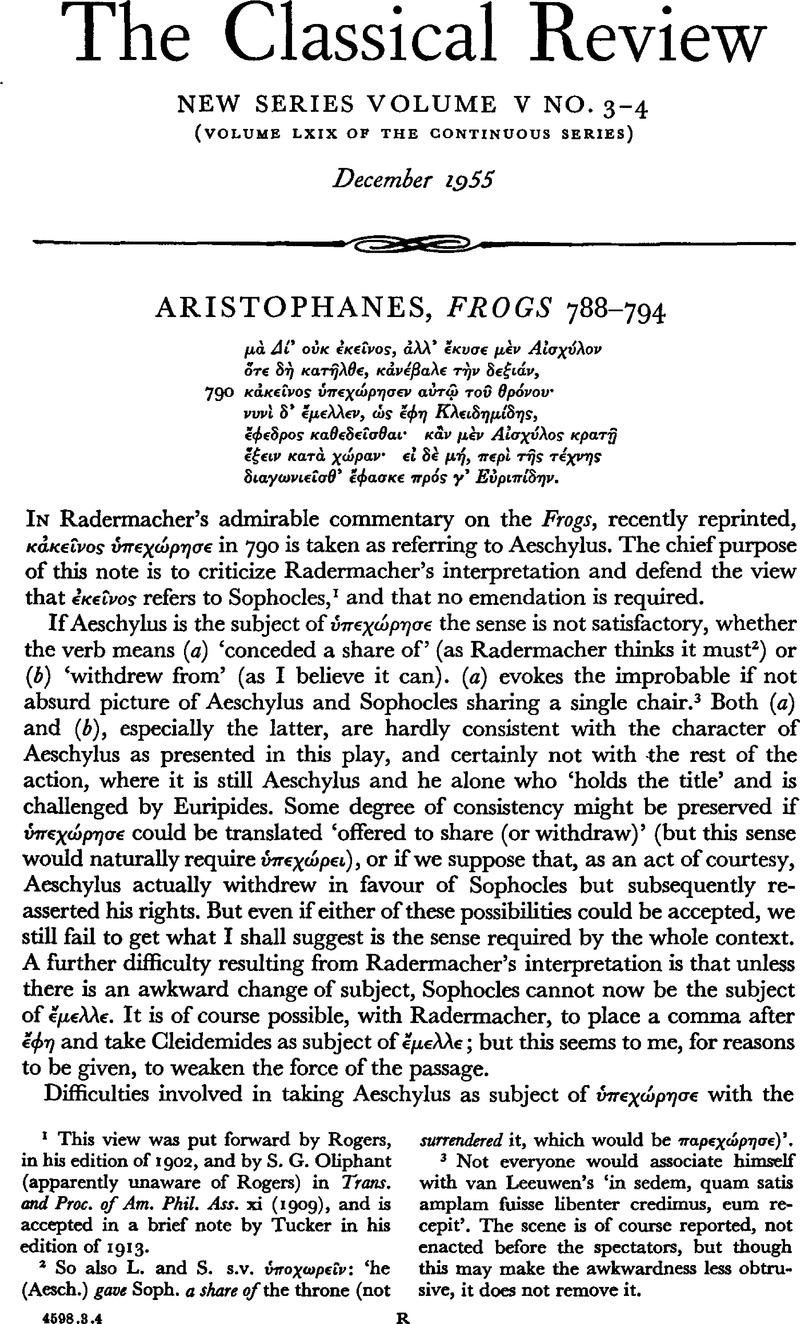No CrossRef data available.
Article contents
Aristophanes, Frogs 788–794
Published online by Cambridge University Press: 13 February 2009
Abstract

- Type
- Review Article
- Information
- Copyright
- Copyright © The Classical Association 1955
References
page 235 note 1 This view was put forward by Rogers, in his edition of 1902, and by S. G. Oliphant (apparently unaware of Rogers) in Trans. and Proc. of Am. Phil. Ass. xi (1909), and is accepted in a brief note by Tucker in his edition of 1913.
page 235 note 2 So also L. and S. s.v. ὑποχωρεῖν: ‘he (Aesch.) gave Soph, a share of the throne (not surrendered it, which would be παρεχώρησε)’.
page 235 note 3 Not everyone would associate himself with van Leeuwen's ‘in sedem, quam satis amplam fuisse libenter credimus, eum recepit’. The scene is of course reported, not enacted before the spectators, but though this may make the awkwardness less obtrusive, it does not remove it.
page 236 note 1 Apart from Rogers, he omits Roemer, A., Rh. M. lxiii (1908), pp. 358–359, who believes the text to be corrupt.Google Scholar
page 236 note 2 I take it that although the general idea of a contest between Aeschylus and Euripides in the underworld might have been in Aristophanes' mind before the death of Sophocles, the plot of the Frogs as we know it, involving the descent of Dionysus to Hades in search of a dramatist to revive the former glories the stage, presupposes the death of Sophocles. The interval may be short, but if Sophocles died in Aug. –Sept. 406, it is not, as Tucker maintains, impossibly short. See A. Ruppel, Konzeption und Ausarbeitung der aristophan. Komödien, p. 45.
page 236 note 3 Oliphant (op. cit.) adduces a large collection of passages to show that τ⋯ν δεξι⋯ν ⋯μβ⋯λλειν normally indicates not a mere greeting but a pledge of co-operation or assurance of special consideration; e.g. in Frogs 754 it puts the seal upon recognition of common interests. Here it may express the assurance of S. that he will not (as might have been feared) enter into competition with A. The usual sense of the phrase thus fits in well with the general view of the passage which I am maintaining; but I should not regard it, as Oliphant does, as the main argument for that view, since it is not incompatible with other interpretations.
page 236 note 4 On any interpretation the point of the reference to Cleidemides remains obscure, It is not surprising that there should be some topical allusions at whose point we can only guess. Radermacher's guess (assuming C. as subject of ἔμελλε) that Ar. is mocking Eur. by threatening him with the competition of a nonentity, seems to me inconsistent with the whole tenor of the play.
page 237 note 1 E.g. Arist. Pol. 1325a7  ‘but it is for the sake of the latter that we engage in the former’, where ⋯κε⋯νου refers to the noun immediately preceding, but also to the more remote ultimate aim contrasted with the activity under discussion. For other examples see Dem. viii. 72, Pl. Euthyd. 271B.
‘but it is for the sake of the latter that we engage in the former’, where ⋯κε⋯νου refers to the noun immediately preceding, but also to the more remote ultimate aim contrasted with the activity under discussion. For other examples see Dem. viii. 72, Pl. Euthyd. 271B.
page 237 note 2 A military metaphor would not indeed be inappropriate to Sophocles' withdrawal and refusal to do battle with Aeschylus.
page 237 note 3 A comparable use of παραχωρεῖν (similar in meaning, as we have seen, to ὑποχωρεῖν) may be found in Dem. xxi. 28 ![]() , ‘I abandon to the state the τιμωρ⋯α to which I might have laid claim’.
, ‘I abandon to the state the τιμωρ⋯α to which I might have laid claim’.




